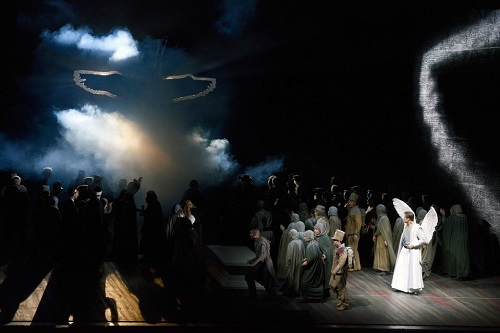 Germany Wagner, Lohengrin: Chorus and Orchestra of the Deutsche Oper Berlin / Axel Kober (conductor), Deutsche Oper, Berlin, 17.12.2017. (JMI)
Germany Wagner, Lohengrin: Chorus and Orchestra of the Deutsche Oper Berlin / Axel Kober (conductor), Deutsche Oper, Berlin, 17.12.2017. (JMI)

Cast:
Lohengrin – Klaus Florian Vogt
Elsa – Anja Harteros
Ortrud – Petra Lang
Telramund – Simon Neal
King Heinrich – Ain Anger
Herald – Thomas Lehman
Production:
Director – Kasper Holten~
Sets and Costumes – Steffen Aarfing
Lighting – Jesper Kongshaug
One of the main points of interest during my stay in Berlin was the Deutsche Oper’s Lohengrin, mainly due to the superb cast that had been assembled, one of the best today. The performance was fine, but it fell short of my expectations: the minimalist staging holds little interest, the musical direction was unconvincing and the performances were somewhat uneven.
This is the well-known Kasper Holten production which premiered in 2012, replacing the traditional and long-lived Götz Friedrich staging. I saw it a year after its premiere, and did not much care for it then either. The stage is basically naked and enclosed by walls. A large cross serves as a gangplank for Elsa’s appearance, and it descends to the ground for the entrance of Lohengrin and Elsa into the cathedral. The nuptial bed becomes a table or altar for the final scene. The costumes are a mixed bag: the soloists wear medieval costumes, while the chorus is dressed in military uniforms from different eras, but mainly from the First World War.
This is a town in a permanent state of war; the prelude takes place on a battlefield with dead or dying soldiers. Lohengrin is not an ordinary human being but rather a magical character, or some sort of religious idol, and he wears large white wings. Holten, in the God Trial of Act I, makes it clear that Lohengrin acts with magical powers when he uses tricks to disorient and defeat Telramund. At the end, Gottfried is brought to the stage in the arms of his sister, but he is dead – which is not what the libretto indicates.
The conductor, Axel Kober, is currently the musical director of the Deutsche Oper am Rhein. Donald Runnicles’ conducting six years ago was much more convincing than Mr. Kober’s, whose reading was short on emotion and occasionally long on orchestral volume. His leadership was efficient, but one expects more in this Wagner opera. Both the orchestra and the chorus did well, although there were some problems in the first act.
Tenor Klaus Florian Vogt was a magnificent Lohengrin from start to finish. He has been criticized for having an excessively white voice, one not suited for heroic characters, but that is not the case with Lohengrin. His voice is one of the best projected that can be heard today: it runs in an extraordinary way through the house even in the ensembles. In addition, he sings with exquisite taste and has a great command of the character. His ‘In fernem Land’ was thrilling.
I always expect the best from Anja Harteros, but this excellent singer was a little disappointing as Elsa. Things did not run well in Act I, where one had the impression that she was taking precautions with her voice. Her performance clearly improved in the following two acts, although it was not the Anja Harteros of the great days.
Once again, Petra Lang sang the part of Ortrud and, as usual, she was convincing in the role. She is one of the best performers of Ortrud in recent years. Her voice was less attractive than on other occasions and she seemed tighter at the top than before, but she was still an excellent Ortrud.
Baritone Simon Neal as Telramund did not go beyond fulfilling his mission, and was also somewhat tight at the top. Ain Anger as King Heinrich was a bit disappointing. His voice is full enough but I remember a more noble tone from him than the one he exhibited here. Baritone Thomas Lehman was well suited to the role of King’s Herald.
José M. Irurzun